In our 61st edition of the Donut Dollie Detail, Evelyn explains how a walk and talk interview with a male director at the Red Cross led to her becoming a Donut Dollie, how a routine day in Vietnam could change in an instant and that a trip to Australia following her year in Vietnam led to it being her becoming her home ever since.
Please share the Donut Dollie Detail with family, friends and veterans you may know, and make sure to like/follow us on Facebook to learn when the next edition is posted.
Please meet Red Cross Donut Dollie Evelyn Safford Jacobs…
What prompted you to join SRAO (Supplemental Recreation Activities Overseas) and want to go to Vietnam?
My college advisor had just posted an American Red Cross (ARC) poster that said, “For The Best Year of Your Life”. It caught my eye, it sounded exciting and I was always up for an adventure. I went back to the dorm and wrote away for an application, when It arrived I filled it in and sent it back immediately. I didn’t really know anything about the war. I was conservative, so hadn’t protested, but didn’t tell anyone what I was doing. The ARC flew me to San Francisco for an interview, so I had to tell my parents what I was doing. The interview was very informal, not at all what I expected. I later realized that the interview was the chat with the male director on the walk to the coffee machine and tour of the office. When we sat down again, he asked me straight away, ‘did I want to go to Korea or Vietnam?’ I said, “Vietnam, I haven’t even considered Korea”. I sat there thinking “where is the interview?”, but I guess it was the ability to talk to him with ease.
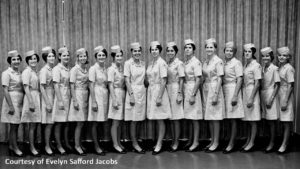
When and where were you stationed in Vietnam? Did you go by a nickname?
In Vietnam I went by Evie and I was posted to An Khe with the 4th Division in the Central Highlands from October 1, 1970 until we closed the unit in early November. The recreation center had been closed, so it was all Clubmobile runs, meaning that we visited the men out on the firebases and units/companies on base camp presenting our programs. We spent a lot of time with the 173rd LRRPs (Long Range Reconnaissance Patrol) on base. We had a regular run to Pleiku. I was transferred to II Field Force HQ in Long Binh in early November. It was also a Clubmobile unit with no recreation center. We had runs to the big base at Long Binh, and forward runs to the 25th Division units out to Tay Ninh and the 11thACR (Armored Cavalry Regiment) out in Phuoc Tuy Province. We also had an overnight run to the Delta.
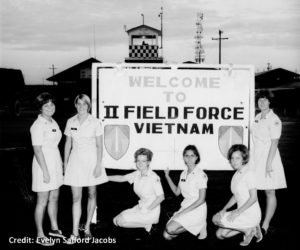
I was transferred to Qui Nhon at the end of April, 1971. It was my first experience working in a recreation center, although it closed shortly after I was assigned to the unit. It was an 8 girl unit, but as the center closed we were reduced to a 5-6 girl unit. I stayed at Qui Nhon until we closed the unit at the end of Sept, 1971. We moved to a BOQ (bachelor officer quarters) across town in an old French hotel on the beach for the last 3 months. It was really just a home base, as we had a 4 day/3 night run to Pleiku, and a 3 day/2 night run to Phu Cat AFB (Air Force Base) with an overnight extension to LZ English. So we weren’t in Qui Nhon a lot.
What was a routine day like in Vietnam?
There were very few routine days in our days in Vietnam, except for runs to the big support bases like Long Binh where we went from one company to another doing our programs. We usually did 6 programs a day. Our job was to boost the morale of the troops. A program consisted of an introduction, a few starter jokes and challenging activities to engage the men, followed by the main trivia game based on a new topic each week. We wrote programs and swapped them between Red Cross units in-country. Each game had a method of scoring, which often involved active participation. The most successful program I wrote was on Motorcycles. I knew nothing about motorcycles, but the men at the recreation center at Qui Nhon supplied all the questions and answers. We would wind down by having a chat as we distributed short timer calendars and puzzles.
Out in the field we would give out goodies sent from Red Cross chapters back home (ie. cards, mirrors, soap, beer can openers, etc.). On the forward runs, we fit in with the conditions. At An Khe, my very first visit to an outpost was on top of a cleared mountain. It was cold and wet. I remember an air mattress floating in a foxhole as we walked around and talked to the men. We may not have done a program due to the conditions. If we did, we would gather the men in one spot, set up our props on sandbags and do a program.
Any routine day could change in an instant. Like the day a GI hitched a ride in our chopper, and over Mang Yang Pass decided he was going to end it all by jumping out. The gunner grabbed him and they saved him. Or the day our Chinook broke down and we set down in an open field with no protection. Or the day we missed the C-130 flight, so we went up to the tower and hitched a chopper ride to Pleiku. Or the day we got caught in an awful thunderstorm on the way back from Ban Me Thout in a fixed wing aircraft. Or the day we flew back to An Khe and the cloud was so thick we couldn’t get down to the chopper pad, so had to fly back to Lane Valley and wait till the cloud lifted. Or the day= our chopper pilot set us down at a remote location and said to go over and ring the bell at the gate, then took off immediately. We got the short shift (in very plain language) by the officer who answered the bell. We later realized it was a secret CIA base in Laos. I was with the unit director and she had stern chat with pilot after we had to sit unprotected in a village for an hour waiting for him to come back.
Some days we would take a mike boat (a mechanized landing craft) up the Mekong River or we would go out in a jeep, but mostly we flew by chopper. One day we flew out to a Navy ship off the coast of Qui Nhon. When visiting the 11th Armored Cavalry Regiment, we would fly all day with Col. Valentine and his kelpie dog. He would visit all his units, and we would do a program while he worked with his command. We would often serve lunch after our midday programs, then sit on the sandbags and eat with the men. If we were on base, we would eat with men at their company mess hall.
I was there late in the war, so we had to deal with the drug problem as well. Sometimes we would start a program only to realize that the whole back row of men were totally stoned. We would just carry on like nothing was wrong.
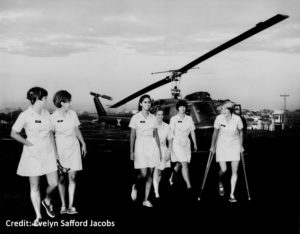
Did you ever have any “close calls” either on base or in any vehicles?
Yes, early in my first weeks in-country flying out of An Khe, a rocket missed the chopper skid by a mere meter. The pilot took evasive action as we dove to a low level along the tree line. A number of times, we could see tracer fire coming towards our bird. Once when we were flying over open rice paddies in the delta, suddenly we were taking fire.
The worst time was a rocket attack at our Qui Nhon base. I woke when the first rocket hit and my fan fell on top of me. My roomie was screaming at me to hit the floor and to pull the mattress over myself. One of the five rockets landed right outside our hooch window. I saw the flash of fire. I remember gripping the concrete floor and praying, “Dear God, please don’t let the next one hit us”.
Were you ever injured in Vietnam?
No, other than having the worst case of (Hong Kong) flu I’ve ever had and a wisdom tooth out, there was nothing. I always say, “I had a lucky war”. My number wasn’t up.
What was it like to visit the soldiers in the hospitals?
I can only recall one scheduled visit to a hospital at Phu Cat Air Force base and they were all non-war related injuries. I did visit a couple guys I knew who’d had surgery at Long Binh. We did visit a Vietnamese hospital in the Phuoc Tuy Province. It shocked me how basic it was. The families were squatting under the beds and cooking whilst looking after the patient who was a family member in the ward.
The II Field Force HQ had a drug amnesty center just down from our compound. A few times, we went down and visited it. That was a real eye-opener to watch guys in various stages of withdrawal from heroin. And it shocked me when I would recognize someone.
How was the transition returning home to the United States?
I didn’t go home to the US. Another Donut Dollie, Dibby and I hopped an an R & R flight to Sydney, Australia after we signed out in Saigon. We spent the first 2 weeks in Australia in Sydney. We met some American G.I.’s who had migrated to Australia. One of the guys, said to us, “Nobody wants to know about Vietnam. And nobody wants to hear about how we do things in America.” So I took his advice. (At that stage, life in Australia was fairly basic.)
Dibby and I started a working holiday. I went to cattle station (a working cattle ranch) and Dibby went to a sheep station working as a Mother’s help. So the adventure went on. We eventually travelled around the Australian Outback on a bus tour and spent 6 weeks backpacking around New Zealand. I met an Aussie and found out they were in need of teachers, so I began a long teaching career. Life went on. I rarely talked about Vietnam until 1987 when the first welcome home march was held in Sydney.
What would you like people to remember and understand most about the women who served?
I always say we were young and naive, and had no idea what we were getting into. We were just “the “girls from next door” who the American Red Cross sent to Vietnam to boost the morale of the troops. We offered a “touch of home in a combat zone” to “the boys who became men” who were called to serve their country. We were the big sisters to those 18-19 year old kids. It changed our lives forever, just like it changed theirs.
Looking back, we were unique women. We were willing to step out of our comfort zones. There were many natural born leaders and high achievers amongst us. The majority of us got on with life after Vietnam, but we realize that it was an experience that we would never ever repeat. And we share a unique bond with all our Donut Dollie sisters, no matter which year we served.
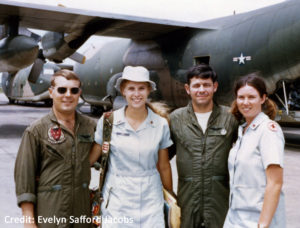
How do you feel Veterans think of your time having served with them? Have any veterans expressed their feeling to you directly?
I’m only in contact with a couple American veterans. One says, I saved his life by getting him out of the field. At the end of our program when he’d answered every question (despite us trying to handicap him), I said to him, “What is a smart guy like you doing in the field!” Apparently, the officers heard me, and took notice of him and he was offered the company clerk’s position back in the rear.
In Australia, I’m generally accepted as ‘one of them’. I was fortunate to visit Nui Dat, the Australian base, several times as we had an artillery unit on the perimeter. So when we talk, they realize that I’ve been there and I can understand the Vietnam experience. Often a wife will say to me, “I’ve just heard him talk more about Vietnam to you than I’ve ever heard”.
I recently went back to Vietnam. I hired a private tour guide who took us out to Long Binh, Bien Hoa, Nui Dat and Vung Tau. He knew the area well. One of the things I realized was that as Donut Dollies we mostly flew everywhere and often didn’t really know where we were on a map or how far we were away from our base.
I’ve done a lot of public speaking as part of ANZAC Day services (our Memorial Day – Australian and New Zealand Army Corps). I now get very emotional when I march and speak at ANZAC services. I went to the Welcome Home march in 1992 in our nation’s capital, Canberra, and to the Vietnam Women’s Memorial Project dedication in 1993 in Wash, DC. Both were huge events for me.
What is your fondest or most interesting memory of Vietnam?
The Long Binh unit got special permission to present a Bob Hope skit to all our troops in the field during the week before Christmas. I was the Sergeant Major who couldn’t dance and Sally was the hot Lt. who could. Roseanna was Bob Hope complete with golf club and jokes. The other 2 girls had pretty dresses. We were to present 7 shows per day for 7 days straight out in the field. We only had 2 failures, due to no power and a hot LZ. We did our dialogue then sang a Christmas carol with the guys and finished up having a dance with a few of the guys. During the skit, Sally (as the Lt.) would ask, “Where did you learn to dance?”, and my punchline reply was, “I went to shake and bake school!” That wasn’t scripted, it just came out of my mouth the second or third show and became one of the most laughed at lines in the skit. Shake ’n Bake was a quick chicken breading product that was popular at the time and referred to Sergeants who went to school to become one, rather than rising through the ranks the hard way. The enlisted men called it ‘Shake ’n Bake School’.
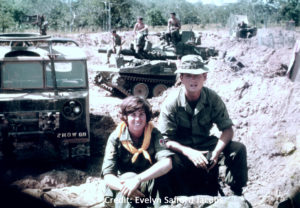
P.S. – After my time in the SRAO program as a Donut Dollie, I remained in Australia. I married my Aussie in 1972 and started teaching for the New South Wales Department of Education. I enjoyed a full time teaching career for 42 years and still do substitute teaching a few days a week due to a teacher shortage. Being a Physical Education teacher, I became heavily involved in Sports organization in both the schools and community. I’m still actively involved in administration of community basketball, and surf lifesaving and play masters field hockey. We’ve lived in beautiful Crescent Head overlooking the Pacific Ocean for the last 42 years. My son is also a PE teacher in western NSW (New South Wales). He and his wife have 2 sons.
PLEASE NOTE: THERE ARE 60 PREVIOUS EDITIONS OF THE DONUT DOLLIE DETAIL AND 2 EDITIONS OF OUR MEMORABILIA MONDAY FEATURES THAT CAN BE SEEN HERE, JUST SCROLL DOWN TO READ EACH (AT THE BOTTOM, YOU’LL SEE A LINK TO GO TO THE NEXT PAGE OF DONUT DOLLIE DETAIL FEATURES)
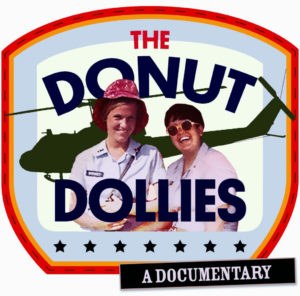
Evie, what a wonderful account of your DD experience! You always had that extra something to add to the group. And your adventures continue to this day! Loved our visit together in Tacoma!!
Your story brought back so many memories. Thank you for sharing.
Never made it to Australia as I got medivac’d out, but just want to thank you ladies so very much.. You have no idea how much you meant to us..
Thank you…
Absolutely wonderful to read Miss J, I admire your story and contribution. x
I have known you a long time, but didn’t realize what an exciting life you had before Crescent. While you did all that, I was married and living in Sydney with three children. I met you and Louie in the early eighties and didn’t know how involved you were in Vietnam. I read your story and was very impressed.
One amazing lady!!